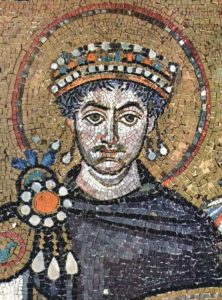 Justinian was emperor of the Byzantine Empire from 527 A.D. to 565 A.D.
Justinian was emperor of the Byzantine Empire from 527 A.D. to 565 A.D.
Justinian ruled from Constantinople, the capital of the Byzantine Empire, the richest city in the world, and the capital of Christendom.
Constantinople was surrounded on three sides by water, and its land facing side was protected by wall 40 feet high and 4 miles long. That wall would successfully protect the city from invasion for 1,100 years.
In addition, the Byzantines had Greek Fire, the best kept secret and most powerful weapon of the medieval world, and only the Byzantines had it. It was the medieval equivalent of a nuclear weapon.
In 533 A.D. Justinian published the Institutes of Justinian, a codification of Roman law considered one of the great achievements in legal history, was published.
Then in 537 A.D. Justinian completed construction of the Hagia Sophia, the largest church in the world. It would remain the largest church in the world for the next 1,000 years.
I’m guessing then that by 537 A.D., Justinian was feeling pretty good about himself, his city, and his empire.
Then, in 542 A.D., the plague hit. As Julius Norwich described it in his History of Byzantium:
“Daily life in the city came to a standstill; the surrounding fields lay unharvested, the markets were closed, the mills and bakeries fell idle with no one to work them…By the time the disease had run its course, the number of its victims was estimated at three hundred thousand…”
Justinian actually contracted the plague himself, and he was expected to die. Justinian survived, but he could not stop the plague from ravaging his city and his empire. Justinian was perhaps the most powerful ruler who had ever lived up to that time, and yet he was powerless to stop the plague.
Fast forward 1,500 years. We have sent men to the moon and spacecrafts to edge of our solar system. From an electronic device we hold in our hands, we can transmit live video around the world, speak to people thousands of miles away, access libraries of information, and even order food. I can speak to a box I call, “Alexa” and it turns on music, the lights in my home, and reads me the news.
And yet, we are just as susceptible to the plague as was Justinian and the Byzantines 1,500 years ago. With all our technological and medical advances, the best we can do is tell people to wear a mask, wash their hands, and stay inside.
It’s a sad, sobering thought. GS

